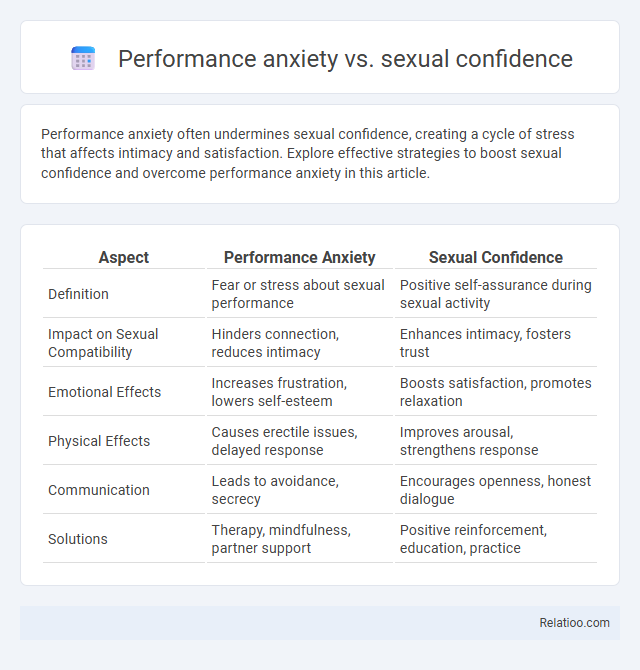Performance anxiety often undermines sexual confidence, creating a cycle of stress that affects intimacy and satisfaction. Explore effective strategies to boost sexual confidence and overcome performance anxiety in this article.
Table of Comparison
| Aspect | Performance Anxiety | Sexual Confidence |
|---|---|---|
| Definition | Fear or stress about sexual performance | Positive self-assurance during sexual activity |
| Impact on Sexual Compatibility | Hinders connection, reduces intimacy | Enhances intimacy, fosters trust |
| Emotional Effects | Increases frustration, lowers self-esteem | Boosts satisfaction, promotes relaxation |
| Physical Effects | Causes erectile issues, delayed response | Improves arousal, strengthens response |
| Communication | Leads to avoidance, secrecy | Encourages openness, honest dialogue |
| Solutions | Therapy, mindfulness, partner support | Positive reinforcement, education, practice |
Understanding Performance Anxiety in Sexual Contexts
Performance anxiety in sexual contexts often stems from fear of judgment or failure, significantly impacting sexual confidence and satisfaction. Understanding performance anxiety involves recognizing its psychological and physiological triggers, such as stress, self-doubt, and past negative experiences. Your ability to build sexual confidence improves by addressing these factors through communication, relaxation techniques, and positive reinforcement.
Defining Sexual Confidence: What Does It Mean?
Sexual confidence refers to an individual's positive self-assurance in their sexual abilities, comfort with their sexual identity, and openness to intimacy without fear of judgment or failure. It contrasts with performance anxiety, which involves stress or nervousness about sexual performance that can hinder physical and emotional connection. Developing sexual confidence fosters healthier relationships and enhances overall sexual satisfaction by reducing fear and promoting authentic expression.
Common Causes of Sexual Performance Anxiety
Performance anxiety often stems from fear of failure, past negative experiences, or unrealistic expectations, hindering sexual confidence and satisfaction. Common causes of sexual performance anxiety include stress, relationship issues, anxiety disorders, and self-esteem problems, which can all interfere with your ability to enjoy intimacy fully. Addressing these underlying factors can significantly enhance sexual confidence and reduce performance anxiety.
Signs and Symptoms: Performance Anxiety vs Sexual Confidence
Performance anxiety manifests through signs such as rapid heartbeat, sweating, and difficulty maintaining focus, directly impacting your ability to perform sexually. Sexual confidence, on the other hand, is characterized by a relaxed mindset, positive self-image, and better control over physical responses. Recognizing these contrasting symptoms helps differentiate between the mental blocks of performance anxiety and the empowerment associated with sexual confidence.
Psychological Factors Influencing Sexual Confidence
Psychological factors such as past trauma, low self-esteem, and negative body image strongly influence sexual confidence by exacerbating performance anxiety. Your ability to maintain sexual confidence depends on managing stress and overcoming fears rooted in societal expectations and personal insecurities. Addressing these mental barriers through therapy or mindfulness practices can significantly reduce performance anxiety and enhance overall sexual well-being.
Effects of Performance Anxiety on Relationships
Performance anxiety significantly impacts relationships by causing decreased intimacy, emotional distance, and communication breakdowns between partners. This form of anxiety often leads to avoidance of sexual encounters, reducing overall relationship satisfaction and increasing frustration or misunderstandings. Building sexual confidence through therapy or open dialogue can alleviate these negative effects, restoring trust and connection within the relationship.
Building Sexual Confidence: Practical Strategies
Performance anxiety often undermines your ability to enjoy intimate moments, while sexual confidence enhances satisfaction and connection. Building sexual confidence requires practical strategies such as mindfulness techniques, open communication with a partner, and gradual exposure to intimate situations that reduce fear and increase comfort. Consistent practice of these methods empowers you to overcome performance anxiety and fosters a positive sexual self-image.
Overcoming Performance Anxiety: Steps and Solutions
Overcoming performance anxiety involves recognizing triggers and implementing techniques such as deep breathing, mindfulness, and cognitive-behavioral therapy (CBT) to reframe negative thoughts. Building sexual confidence requires consistent practice, open communication with partners, and focusing on sensations rather than performance outcomes. Effective solutions also include lifestyle adjustments like regular exercise, adequate sleep, and limiting alcohol consumption to reduce anxiety symptoms and enhance overall sexual wellbeing.
Communication’s Role in Enhancing Sexual Confidence
Sexual confidence significantly improves when open communication addresses performance anxiety, which often stems from misunderstandings and unrealistic expectations. Your ability to express desires, concerns, and boundaries reduces stress, fostering a supportive environment that enhances intimacy and satisfaction. Effective dialogue creates trust, making it easier to overcome performance anxiety and build lasting sexual confidence.
When to Seek Professional Help for Performance Anxiety
Performance anxiety significantly impacts your sexual confidence by causing persistent doubts and physical symptoms that hinder intimacy. When anxiety leads to frequent avoidance of sexual activity, disrupts relationships, or causes emotional distress, it is crucial to seek professional help. Early intervention with a therapist or healthcare provider can provide effective strategies and treatments to restore confidence and improve overall sexual well-being.

Infographic: Performance anxiety vs sexual confidence
 relatioo.com
relatioo.com